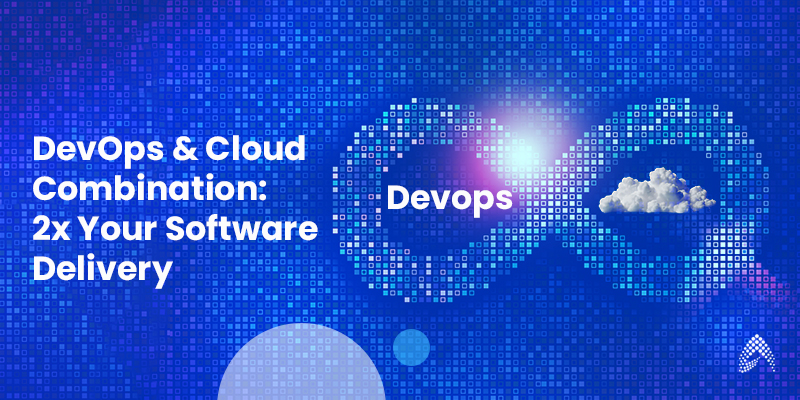Future-Proofing Your Development: Why DevOps and Cloud is the Winning Formula

In the fast-paced world of software development, traditional waterfall methodologies often fall short of meeting the demands of modern businesses. Long development cycles, rigid processes, and a disconnect between development and operations teams can lead to slow deployments, missed opportunities, and ultimately, frustration for all stakeholders involved.
However, the advent of cloud computing and DevOps practices has revolutionized the landscape, ushering in a new era of agility, efficiency, and innovation. This transformation goes beyond mere technology; it represents a fundamental shift in how organizations approach software development, deployment, and maintenance.
The limitations of traditional app development methods are clear:
1. Ineffective in meeting rapidly changing market demands
2. Lack of scalability to accommodate growth
3. Stifled innovation due to rigid processes
4. Compromised customer satisfaction due to delayed updates
5. Prolonged development and deployment cycles
The combination of cloud computing and DevOps practices offers a compelling solution to these challenges. A recent study by Google Cloud and Harvard Business Review Analytic Services found that organizations that adopt DevOps and cloud technologies are 24 times more likely to have high organizational performance, demonstrating strong IT and business outcomes.
In DevOps, CI/CD pipelines automate the integration of code changes, testing, and deployment, allowing frequent and consistent software updates. Popular tools like Git (version control), Jenkins (CI/CD server), and Ansible (Infrastructure as Code) empower DevOps practices and streamline the development workflow.
The cloud offers on-demand resources that can be scaled up or down instantly to meet fluctuating development needs. This agility allows development teams to focus on building software, not managing infrastructure. Furthermore, cloud platforms provide numerous services that directly benefit DevOps practices. Containerization platforms like Docker and Kubernetes simplify deployments and application management.
The benefits of this powerful combination are numerous:
1. Automated Infrastructure Provisioning:
Cloud platforms enable rapid provisioning of virtual machines and resources, freeing teams to focus on coding and innovation.
2. Streamlined Development Workflow:
DevOps practices like continuous integration (CI) ensure smooth code merging and early bug detection, while continuous delivery (CD) automates the deployment process for frequent, low-risk updates.
3. Rapid Feedback and Iteration:
Cloud environments facilitate faster testing and deployment cycles, allowing developers to gather user feedback quickly and iterate on features in real-time.
A prime example of the successful implementation of cloud and DevOps is Netflix. By leveraging Amazon Web Services (AWS) and implementing a CI/CD pipeline, Netflix has reduced feature deployment time from weeks to mere hours. This agility enables them to stay ahead of trends, respond quickly to customer feedback, and deliver a superior user experience. As a result, Netflix has seen a 50% reduction in customer-impacting incidents and a 95% reduction in time to deploy new features.
The strategic benefits of adopting Cloud and DevOps extend far beyond efficiency gains.
1. Increased Innovation:
Faster development cycles and easier experimentation fuel a culture of innovation, allowing organizations to stay ahead of the curve. Cloud and DevOps practices enable teams to test and validate new ideas quickly, leading to a 21% increase in innovation and new feature development.
2. Improved Scalability:
Cloud infrastructure scales effortlessly to meet growing needs, enabling businesses to focus on building features rather than managing servers. Organizations that adopt cloud and DevOps practices report a 19% increase in their ability to scale resources to meet demand.
3. Enhanced Collaboration:
DevOps practices promote closer collaboration between development, operations, and security teams, leading to better communication and fewer bottlenecks. Teams that adopt DevOps practices experience a 25% improvement in team collaboration and communication.
4. Reduced Costs:
The cloud eliminates the need for upfront hardware investments and allows organizations to pay only for the resources they use, leading to significant cost savings. Organizations that migrate to the cloud and adopt DevOps practices report an average cost savings of 20-30%.
5. Improved Security:
Cloud providers invest heavily in security infrastructure and compliance, offering a more secure environment for applications. Implementing DevSecOps practices, which integrate security into the development process, can reduce security vulnerabilities by up to 50%.
6. Faster Disaster Recovery:
Cloud platforms offer robust disaster recovery features, allowing organizations to recover from outages quickly and minimize downtime. Cloud-based disaster recovery solutions can reduce recovery time by up to 90%.
7. Empowered Developers:
By automating repetitive tasks and providing on-demand resources, cloud and DevOps empower developers to focus on writing great code. This leads to a 22% increase in developer productivity and a 17% improvement in employee satisfaction.
Cloud Migration Challenges
While the benefits of adopting cloud and DevOps are clear, it’s important to acknowledge the potential challenges organizations may face during this transition. Legacy systems, skill gaps, and organizational resistance to change can pose hurdles. To overcome these challenges, consider the following strategies:
1. Develop a clear roadmap:
Establish a phased approach to adopting cloud and DevOps practices, prioritizing initiatives based on business impact and feasibility.
2. Invest in training and upskilling:
Provide your teams with the necessary training and resources to acquire the skills needed for success in a cloud and DevOps environment.
3. Foster a culture of collaboration:
Encourage open communication and collaboration between development, operations, and security teams to break down silos and facilitate a smooth transition.
4. Start small and iterate:
Begin with smaller, low-risk projects to gain experience and build confidence before scaling to more complex initiatives.
Future Trends Of Cloud and DevOps:
Looking ahead, several key trends in cloud migration and DevOps are expected to shape the future of software development:
1. Serverless Computing:
Serverless computing, with platforms like AWS Lambda and Azure Functions, allows developers to focus solely on writing code without managing servers, further simplifying infrastructure management.
2. AI and Machine Learning Integration:
AI is expected to play a larger role in DevOps, automating and enhancing operations such as traffic forecasting and resource scaling, leading to proactive system maintenance and enhanced efficiency.
3. The Rise of Hybrid and Multi-Cloud Environments:
As businesses increasingly adopt hybrid and multi-cloud strategies, DevOps methodologies will evolve to effectively manage these complex environments, providing visibility and control across diverse platforms.
In conclusion, the future of software development lies in the powerful synergy of cloud computing and DevOps. By embracing this transformative approach, organizations can unlock unparalleled agility, efficiency, and innovation. CIOs, CTOs, and technology leaders who recognize the strategic importance of this shift will be well-positioned to drive their organizations forward in an increasingly competitive digital landscape. The journey to cloud and DevOps may present challenges, but the rewards are well worth the effort with the right strategies and a commitment to continuous improvement.
Join the journey and unlock the immense potential that awaits!

Director – Global Delivery




